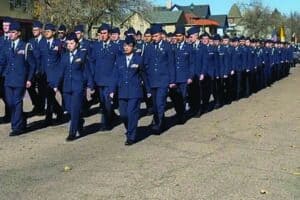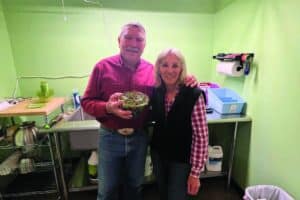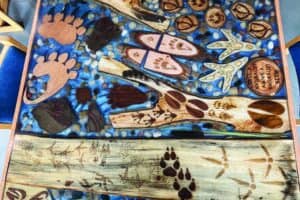Raised in a military family, Cheryl Brooks was exposed to many cultures through frequent moves. She was born in New Jersey, but throughout her school years Brooks lived in three different states as well as Italy and Germany.Twice her family relocated to Italy. “It was great,” she said. “Of course, I didn’t realize it as much then as I do now.” Brooks remembers visiting Venice and the Isle of Capri – exotic locales most tourists save for months to reach.Although Brooks and her family traveled to other parts of Europe, she was fond of Italy. “I would have to say that was one of the best times in my life,” she said. “I have so many memories of Italy. I loved it.”Because she loved Italy, in 1984, Brooks decided to stay another year. She lived with her parents while babysitting during the day and taking classes at the University of Maryland European division at night.After a year, Brooks’ family moved to Ft. Carson, Colo., and her father retired from the Army.In 1985, she met her husband, Ron, at Homer’s Odyssey, a local dance club. “[Homer’s Odyssey is] not in business anymore, but I remember they used to have 3.2 beer,” she said. “I wasn’t 21 yet, but I didn’t even drink beer. I liked to dance.” A year later, they were engaged and Ron left the Army. Brooks accompanied him to New York where he started college. In 1987, they returned to Colorado and married, with a short honeymoon in Glenwood Springs, Colo.Back in New York, Ron attended Paul Smith’s College in the Adirondacks for an associate’s degree in forest recreation. Meanwhile, Brooks worked in retail. “My husband was going to school full time and I had to support us,” she said. “And back then, minimum wage was $3.35.”Eventually, Brooks and her husband ventured back to Colorado Springs where they rented an apartment. Brooks worked for a while at both Falcon Air Force Base – now Schriever – and Peterson Air Force Base while her husband did maintenance work for the apartment complex where they lived.In 1990, the couple welcomed their first child, a daughter they named Sara. Ron rejoined the Army for two years for the insurance and other benefits. They moved to Washington for a brief stay, but returned to Colorado in 1992.Ron returned to school for his bachelor’s degree, while Brooks took a job working at a doctor’s office.In 1995, Brooks changed employers, but continued to work in the medical field, while her husband graduated with a degree in computer science in 1997. He secured a job with Insurance Technologies as a software engineer, where he remains today.”After a few pay raises, I was able to quit my job and stay at home,” Brooks said.Despite their early financial struggles, Brooks and her husband were now in a comfortable place. Comfortable enough that the couple decided to try to have another baby. But because of a condition called secondary infertility (being able to conceive one child, but not another), they decided to adopt. “We had always talked when we first married, even before we had Sara, that we wanted to adopt,” Brooks said.The couple originally planned to adopt from Kazakhstan, but they require adoptive parents to live in the country four to six weeks. They researched other countries. “We liked Guatemala because it was closer [to the United States] and you only have to be in the country for three or four days,” she said. The more they looked into it, the more positive qualities the Brooks found about adopting a baby from Guatemala.”Some of the kids are living in children’s homes, but most of them are living in foster homes,” she said. “And there is not much incidence of fetal alcohol syndrome, and you could get a young baby home rather quickly.”Brooks said the adoption process includes plentiful paperwork and a lot of waiting. She said some families could be caught for years in a trap called PGN, which is equivalent to the U.S. attorney general’s office. The PGN is the office with legal oversight over the adoption process in Guatemala.”They go through every single file, birth certificates,” she said, “and some reviewers are anti-adoption, so they could reject your paperwork for the littlest thing and make you redo it.” She said there is no rhyme or reason for how they decide who is rejected or approved. “You can’t do anything,” Brooks said. “When you’re stuck, you’re stuck because this is the Guatemala side.” She said her family was lucky both times they adopted, and everything fell into place.With each child, Brooks and her husband traveled to Guatemala to pick up their children: their son, Jason, and, more recently, their new daughter, Keira. Brooks said both children have adapted with ease to living with their new family.Brooks said she has read on the Internet that people frequently ask parents who’ve adopted outside of the states why they didn’t choose American children. “No one has said that to me,” she said. “But if they did, I would just say, ‘My son and daughter were in Guatemala. That’s where they were.'”A little more on Cheryl BrooksDo you think living in Falcon/Peyton is easier on family life – better for the children?Yes, the kids can go out and there is a lot of room to play. There’s not as much noise, and it’s just a slower pace.For people who adopt children from another culture, how important is it to blend their customs, traditions, roots with American culture?I think it’s really important. I try to include all their native holidays. We talk about Guatemala all the time. Sometimes we will try and watch documentaries. We would love to try and go back there when they get older. I think it is really important to know where they come from and be proud of that.What advice would you give to other parents who are considering adopting a child?Research, research, research and find a good agency – one with a good reputation, good contacts and (one that) is well established.






